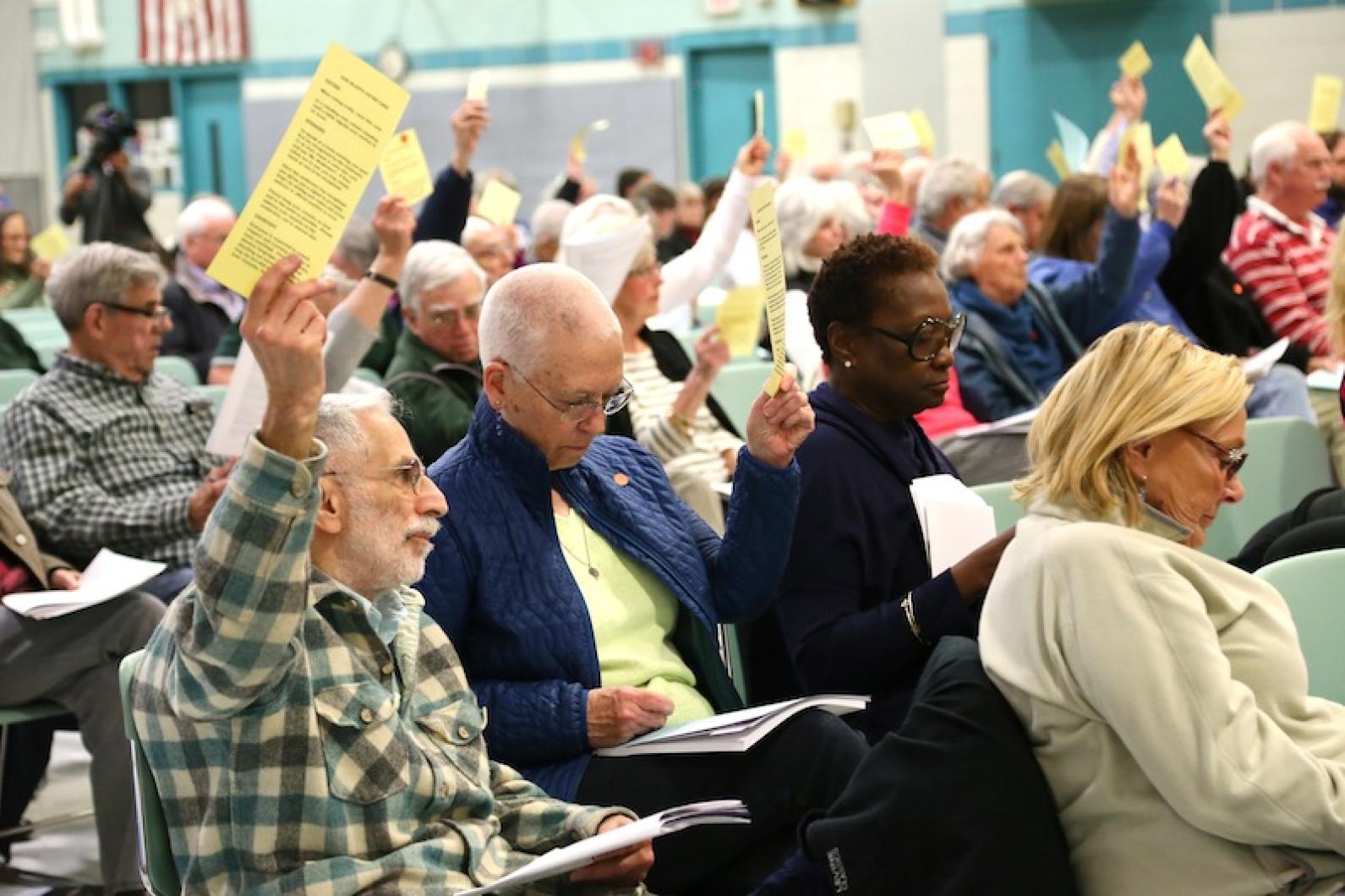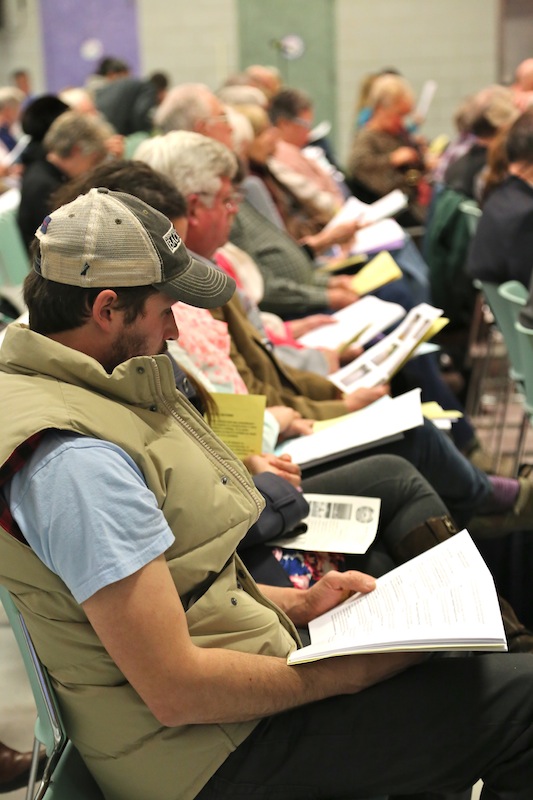Oak Bluffs voters gave strong backing to regional projects at their annual town meeting this year, including those that aim to boost services for the elderly in the years ahead.
A total of 227 voters turned out for the nearly four-hour meeting at the Oak Bluffs School. Moderator Duncan Ross, filling in for Jack Law, presided.
Nearly a quarter of the meeting was spent discussing the purchase of a building to house a senior day care, a much-debated Islandwide project.
Voters lined up to be heard on both sides of the initiative, which would involve buying the old Vineyard Nursing Association building off State Road in Vineyard Haven for Dukes County to rent to the Center for Living.
The center, a nonprofit organization that works with the senior population, operates a social program during the day at two senior centers.
Now they are looking for a permanent home.
“A society is judged by the care that it takes of its elderly, infirm and children,” said Karen Achille, quoting a popular saying, in remarks made on behalf of the Center for Living board of directors. “Let us not forget the elderly in this particular vote.”
Opponents were careful to voice their support for the elderly population, and some even said they were members of that growing group. But they questioned the specifics of the article, which does not give an exact amount for the town’s portion of the $1.4 million estimated building cost.
“I need to know more about this before I feel comfortable spending money on a building,” said Thad Harshbarger.
The finance committee also opposed the article, adding that once the county owns it, the towns will be charged for renovations.
“We are leery of taking on additional open-ended commitments,” said finance committee chairman Steve Auerbach. “We think a more complete plan needs to be submitted before we can sign onto this long term obligation.”
In the end voters approved the purchase by a wide majority.
There was also heated discussion early in the meeting over whether town clerk Laura Johnston should get a four per cent raise, which would bring her salary to just over $81,000 instead of the $79,610 recommended in the budget. “I believe this is fair and equitable and in line with other department head increases,” she said.
But selectman Walter Vail, who was against the increase, said the relatively inexperienced town clerk, who was elected last year, should not be paid as much as her predecessor, Deborah deBettencourt Ratcliff. “I am objecting to her approach to get more and more money from the town,” Mr. Vail said.
Finance committee member Maura McGroarty said the salary should be set by voters, not by the classification system, which recognizes years of experience. After lengthy back-and-forth discussion, voters narrowly approved the raise (82-77) in a standing vote.
With that settled, voters turned to the $26.5 million operating budget, which is three per cent higher than last year, approving it with little further discussion.
Other issues on the warrant ranged from infrastructure to estuaries to elder services.
Voters approved a $910,000 package of Community Preservation Act spending, including 12 projects of local and regional significance. But before it was approved, a request for $27,000 to restore stained glass windows at the Trinity Church sparked debate. Speaking in favor of the project, community preservation committee member Bo Fehl said the church and the surrounding Camp Ground are important tourist destinations.
But others said taxpayers shouldn’t support religious institutions. “In this country we long ago decided against that,” said resident Brian Hughes.
A request for $63,000 to replace the regional high school running track also drew debate.
Christine Todd asked if the town should be contributing to a regional school project, in light of the millions of dollars already assessed for education.
But supporter said the track is accessible to the entire community, not just student runners “Every kid will be on that track in some point in their life and I think it’s a positive part of our community,” said David Diriwachter.
In the end, all 12 CPA projects were approved.
Voters also threw their support behind two projects to improve the health of town estuaries, approving a new watershed planning district for Lagoon Pond, where an excess of nitrogen is polluting the natural habitat. In another pair of articles, they backed the expenditure of $500,000 for a project to widen an existing culvert at Farm Pond. The town is pursuing a federal grant to finance the work, which requires a 35 per cent local match.
Shellfish constable David Grunden said the project would flush out the pond and bring it up to Clean Water Act standards. He said if computer models are correct, the town will not need to sewer the surrounding neighborhood in order to clean up the watershed. “This is a whole lot cheapter than having additional sewering,” he said.
At a special town meeting which preceded the annual, voters set aside $260,000 for a new ambulance, and $75,000 for a set of fire hoses, nozzles, hand tools and a battery-operated jaws of life. They also agreed to spend $14,295 on radar speed trailers, $16,000 for Segways, and $74,000 for the replacement of two police department vehicles. They paused at a request for $20,000 to buy body cameras for town police officers. “In America where we value our privacy, we should take a deep thought before we have police ... monitoring our behavior without cause,” said Brian Hughes. Police chief Erik Blake said use of the cameras would be restricted. “The policies and procedures are very clear about where and when you can turn them on,” he said. The chief said his officers would be videotaping in places where filming is already permitted by the general public. “I’d like to have my own videotape,” he said. “It’s the wave of the future and I think most people support it.” Nearly all the voters agreed, raising their yellow cards to buy the body cameras. Another pause came before a vote on a $23,000 update the town website.
In a short presentation, information technology director Travis Larsen said the new site would improve communication and transparency, and deepen civic pride in the town’s online presence. “We want you to feel like you are a part of your own government,” he said.
There were murmurs of approval, but also some critics.
Christine Todd said the current website is “nonfunctional and noninteractive,” not because of its design but because of the lack of data entered by town employees. Tom Hallahan said he thought the new site was too costly. “This seems like a really high figure,” he said. “I was thinking more like half of that.”
Later, voters showed further support for elder initiatives when they agreed to spend $1,048 on a website that allows senior centers to track engagement, and $16,000 on a program that would hire staff to assist seniors in finding services and information. Voters also approved:
• $41,000 for harbor maintenance projects;
• $30,000 plus lease costs for a new dump truck for the highway department;
• $2,700 for new voting booths;
• $10,000 for a post-closure plan for the former town landfill;
• $100,000 for stairways and railings at town beaches;
• $30,000 for a new the roof at the sailing camp.
They also endorsed a new bylaw that establishes a special permitting process for large-scale and community-based solar energy projects. The planning board designed the regulations to keep red tape and costs at a minimum, member Kris Chvatal said.
Throughout the evening, Mr. Ross the temporary moderator kept the mood light, cracking the occasional joke. As the night wore on, attendance dwindled and voters began glancing at watches and fidgeting in seats. More than once, long-winded speakers were interrupted by audible impatience. “Move the question,” voters called. But when given the option of reconvening another night, they declined the offer.
The final article asked voters to require the Martha’s Vineyard Hospital to create and pay for a new public road separating the Windemere neighborhood from the hospital.
During a renovation project in 2010, the hospital assumed the use of a roadway that connects Beach Road with the Windemere neighborhood. Neighbors have complained that the expansion, part of which sits directly on a former town road, landlocked their properties so that the only way in and out is through hospital grounds.
But as soon as the article was presented, Polly Prince, an attorney representing resident Patrick King, asked for an amendment directing the hospital to restore a greenway barrier and to discontinue the public ways that were “illegally built on” during the hospital expansion.
After conferring with town counsel Michael Goldsmith, Mr. Ross said without the signatures of 10 petitioners, the amendment was invalid. Ms. Prince appealed the moderator’s ruling to no avail. Fewer than seven voters stood to endorse her appeal, and the motion failed.
“You did not have seven, it’s out of order,” Mr. Ross said.
Just before 11 p.m., the meeting was adjourned.







Comments
Comment policy »